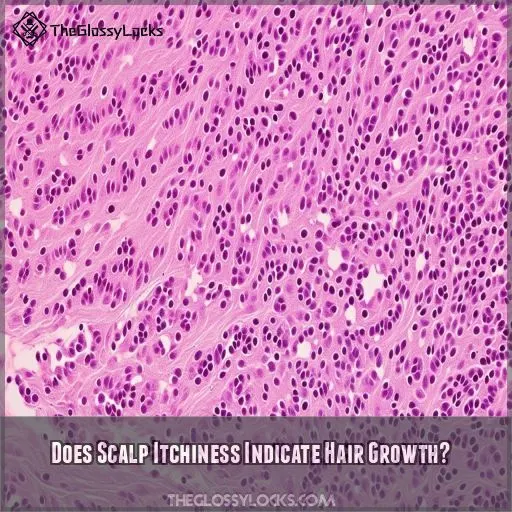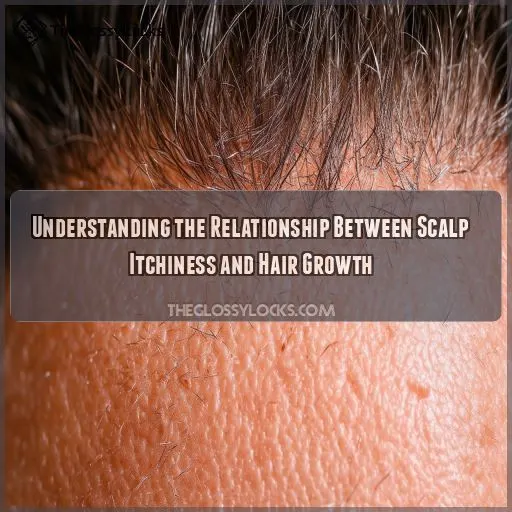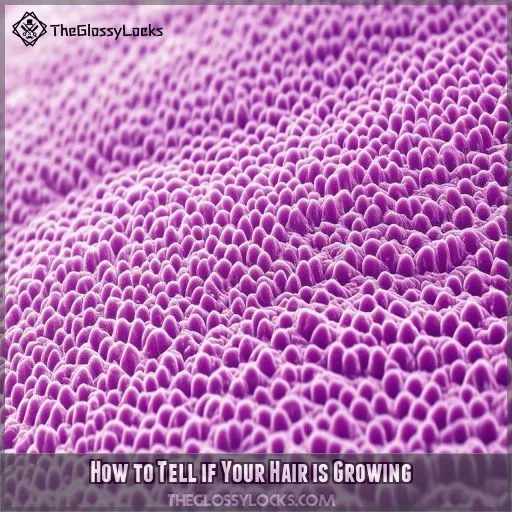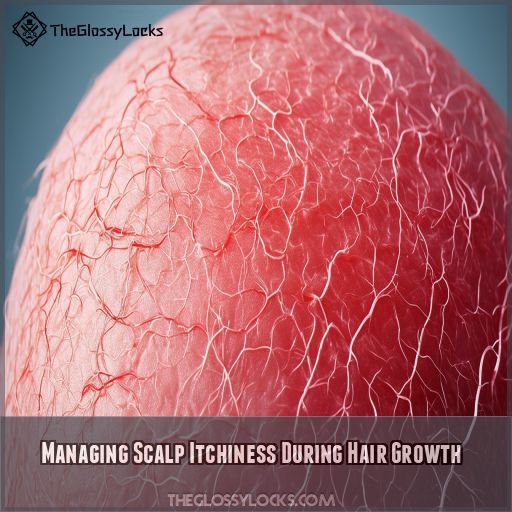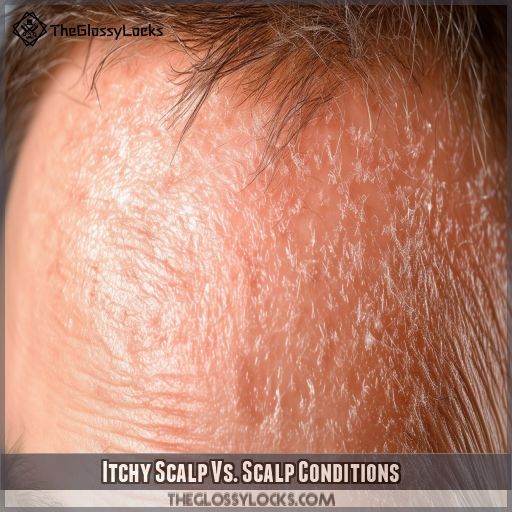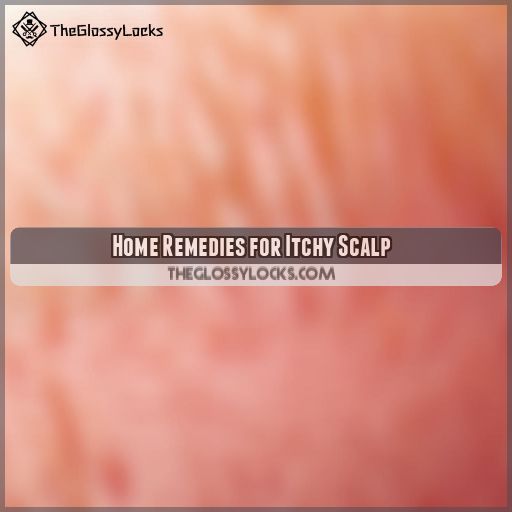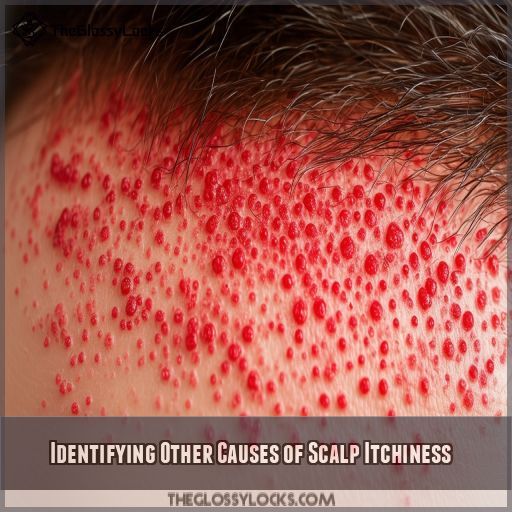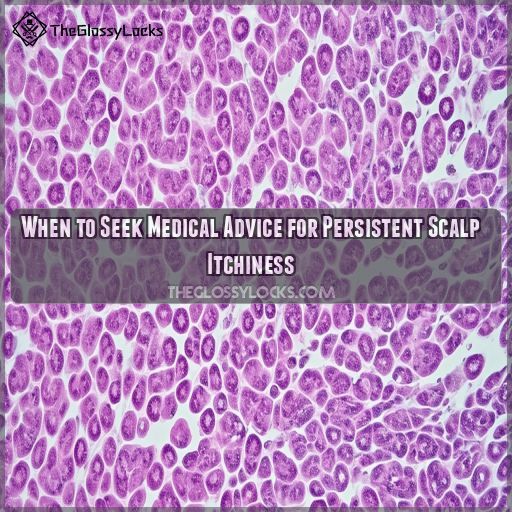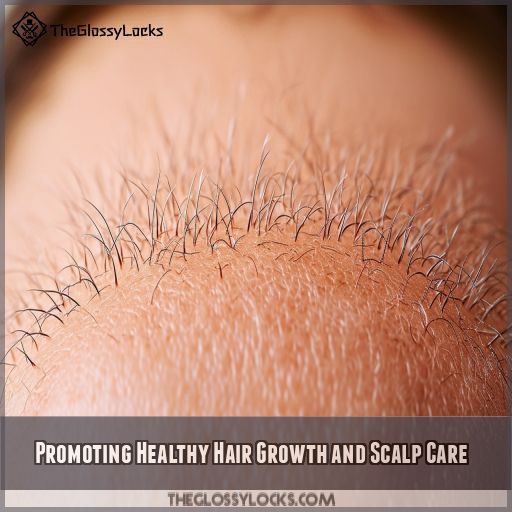This site is supported by our readers. We may earn a commission, at no cost to you, if you purchase through links.
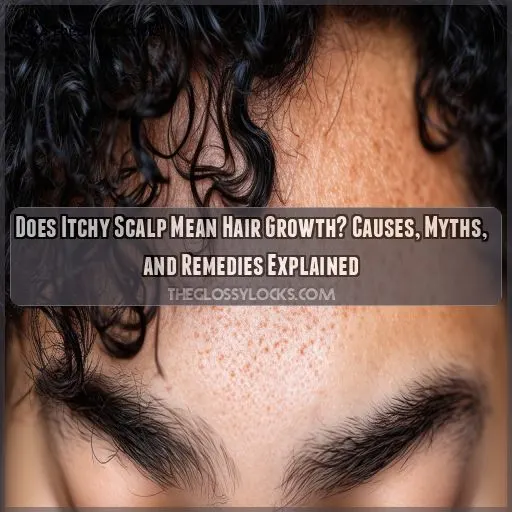 Picture your scalp like fertile soil that buds with new hair.
Picture your scalp like fertile soil that buds with new hair.
You may ask yourself, "Does an itchy scalp mean hair growth?" You would want to know if that tingle in your head gargles new hair or something else.
The article comprises guidance on the association of scalp itchiness and hair growth, myths busted, causes, and remedies for this condition.
Learn what an itchy scalp really means and how you can adequately care for your scalp to facilitate healthy hair growth.
Table Of Contents
- Key Takeaways
- Does Itchy Scalp Mean Hair Growth?
- Does Scalp Itchiness Indicate Hair Growth?
- Understanding the Relationship Between Scalp Itchiness and Hair Growth
- How to Tell if Your Hair is Growing
- Managing Scalp Itchiness During Hair Growth
- Itchy Scalp Vs. Scalp Conditions
- Home Remedies for Itchy Scalp
- Identifying Other Causes of Scalp Itchiness
- When to Seek Medical Advice for Persistent Scalp Itchiness
- Promoting Healthy Hair Growth and Scalp Care
- Frequently Asked Questions (FAQs)
- Does your scalp itch when your hair is growing?
- How can you tell if your hair is growing?
- What does it mean when your scalp itches?
- What causes new hair growth on the head?
- Can dandruff worsen with hair growth?
- Are scalp massages beneficial for hair health?
- Do hair growth supplements stop scalp itch?
- Is scalp exfoliation safe during hair growth?
- Can itchy scalp be an allergic reaction?
- Conclusion
Key Takeaways
- An itchy scalp can be a sign of hair growth, but don’t jump to conclusions! It could also be a sign of dryness, dandruff, or other scalp conditions.
- If your scalp is itchy and you’re not sure why, try some home remedies like coconut oil or tea tree oil. If the itchiness persists, see a dermatologist to rule out any underlying conditions.
- Healthy hair growth starts with a healthy scalp. Make sure to wash your hair regularly, exfoliate your scalp, and get regular trims to keep your hair looking its best.
- If you’re experiencing hair loss, don’t despair! There are many things you can do to promote hair growth, such as eating a healthy diet, getting enough exercise, and managing stress.
Does Itchy Scalp Mean Hair Growth?
Does an itchy scalp mean your hair is growing? Well, it can sometimes be a sign, but it’s not a guarantee. When new hair pushes through your skin, it can cause a tingling or itchy sensation.
Plus, increased blood flow to your scalp during hair growth can contribute to that itchy feeling. So while an itchy scalp may indicate your hair is growing, it could also signal other issues like dandruff or skin conditions.
The best way to know for sure is to keep an eye on any new hair growth. And if the itchiness persists, you may want to consult a dermatologist to get to the root of the problem.
Does Scalp Itchiness Indicate Hair Growth?
Scalp itchiness can sometimes indicate hair growth due to the stimulation of hair follicles. When new hair grows, it can cause a tingling or itchy sensation as it pushes through the skin. Increased blood supply to the scalp during the hair’s growth phase also contributes to this sensation.
However, not all scalp itchiness is related to hair growth; conditions like dryness, dandruff, or scalp disorders may be the culprits. Effective treatments address the underlying issues to reduce itchiness and promote healthy hair growth.
Understanding the Relationship Between Scalp Itchiness and Hair Growth
While it’s common to believe that scalp itchiness indicates hair growth, this isn’t necessarily the case. Factors like increased blood supply to the scalp or new hair pushing through the skin may cause irritation, but they’re often overshadowed by more common triggers like dandruff or allergies.
Increased Blood Supply to the Scalp
An itchy scalp may be an indication of increased blood flow, which is quite essential to hair growth. Blood flows more into your hair follicles, thus carrying essential nutrients and oxygen for healthier hair.
Topical treatments can enhance this stimulation, ensuring better health for your hair. However, a distinction must be drawn from other conditions or irritations that may cause itchiness on your scalp.
New Hair Pushing Through the Skin
When new hair pushes through the skin, it can sometimes cause itching. This is due to hair follicles activating during the hair growth cycle, leading to minor skin irritation. An itchy scalp might be a sign of baby hairs growing, indicating good scalp health. However, continuous itching could signal other conditions or issues.
Hair Follicle Stimulation
Hair follicle stimulation can lead to scalp itchiness. When follicles are active, increased blood flow and nerve ending stimulation can cause an itchy sensation. Here are four reasons:
- Enhanced blood flow promotes hair growth.
- Active follicles might irritate nerve endings.
- Skin health changes.
- Underlying health issues like dandruff treatment or scalp psoriasis.
How to Tell if Your Hair is Growing
Wondering if your hair is actually growing? There are a few telltale signs to look out for.
First, notice if your hair seems longer or your bangs need more frequent trims.
Second, check for new baby hairs along your hairline or part.
Third, see if your ponytail or bun feels thicker.
Finally, gently run your fingers through your hair – can you feel the soft, downy texture of new growth?
Pay attention to these subtle changes to confirm your hair is indeed on the move.
Managing Scalp Itchiness During Hair Growth
Managing scalp sensitivity includes keeping the scalp from getting itchy while hair is growing by stimulating growth without secondary infections in the skin.
Always ensure good hair hygiene to minimize any chances of dandruff and diseases such as psoriasis, seborrheic dermatitis, and eczema.
Simple home remedies like massaging coconut oil into the scalp provide relief from itchiness and nourishment to the scalp.
Ensure you treat itching promptly to avoid scratching that might lead to infection. This will also help in soothing the discomfort during the growth phases through regular moisturizing of your scalp.
Itchy Scalp Vs. Scalp Conditions
Knowing the difference between an itchy scalp and the underlying conditions.
Upon occasion, an itchy scalp may mean hair growth since new hairs tend to push through or even mean that there’s increased blood flow. However, don’t dismiss ordinary regressions of scalp issues such as dandruff, tinea capitis, or allergic reactions that may cause irritation and inflammation of the scalp.
Scalp hygiene would be prominent in trying to alleviate symptoms.
Other conditions that may result in incessant itchiness include such infestations as head lice or scabies and conditions like hives. Persistent itchiness won’t only prevent damage to the scalp but also prevent falling hair.
Home Remedies for Itchy Scalp
While the most important thing is to differentiate between simple itchiness and scalp conditions, an itchy scalp finds relief at home. These harmless and practical solutions may curb discomfort and offer a way to healthy hair growth.
- Tea tree oil: Apply for antifungal properties.
- Coconut oil: Moisturizes and relieves dry skin.
Quantity: – Apple cider vinegar: The rinses will soothe your scalp.
- Zinc and selenium: Found in antidandruff shampoos.
- Massage: The massage enables better circulation and dissipates tension.
Identifying Other Causes of Scalp Itchiness
Itching in the scalp can be caused by conditions as simple as dandruff and as tolerant as parasitic infections, such as lice. In relation, allergic reactions from hair care products should be first ruled out to manage the condition properly.
Scalp Conditions Overview
In treating an itchy scalp, one must distinguish clearly between conditions that will trigger hair growth and those that will trigger simple scalp conditions. Standard conditions include dandruff, seborrheic dermatitis, psoriasis, eczema, and reactions to products. All these could be causative for a persistent itch. These can be treated with apple cider vinegar and relieved by coconut and tea tree oil.
| Condition | Symptoms | Causes | Treatment | Prevention |
|---|---|---|---|---|
| Dandruff | Flakes, itchy scalp | Fungus | Dandruff shampoos | Avoid harsh products |
| Reaction to hair product | Itchy, red rash | Allergic contact dermatitis | Discontinue the use of the product; consult with a dermatologist | PATCH TEST HAIR PRODUCTS |
Parasite-Related Itchiness
Head lice and scabies cause itching caused by parasites. These are also highly contagious and spread from person to person through close contact.
Lice can be seen on the scalp; scabies burrow into the skin, leading to severe itching.
Therefore, identifying their type should be done for proper treatment since some of these treatments may take weeks, depending on the severity of the infestation.
Allergic Reactions Diagnosis
If you suspect scalp irritation from a hair product, it might be contact dermatitis. Signs include itching, redness, and flaking. An allergic reaction can worsen scalp sensitivity. Stop using the product immediately and consult with a dermatologist for a precise diagnosis and targeted treatment to alleviate your discomfort.
When to Seek Medical Advice for Persistent Scalp Itchiness
If the persistent itchiness on your scalp isn’t just a mere sign of hair growth, then it’s something else. You should pay attention if you have observed changes in your skin or persistent irritation and even rashes despite using a different line of products.
Such conditions could include signals for parasites or an underlying health condition. If not checked, such conditions keep worsening.
It’s paramount that if it doesn’t get better with over-the-counter treatments, a dermatologist should be consulted for the diagnosis and appropriate treatment based on the actual cause of the itchiness.
Promoting Healthy Hair Growth and Scalp Care
Promoting healthy hair growth involves moisturizing your scalp to prevent dryness and irritation.
Regularly exfoliate your scalp to remove dead skin cells and promote blood circulation.
Scalp massages can further increase blood flow, supporting hair follicles.
Consider hair growth supplements, like biotin and vitamins, to boost nutrients essential for hair growth.
Protective hairstyles, such as braids and twists, can minimize damage and breakage, allowing your hair to grow stronger and longer.
Remember to maintain a balanced diet and stay hydrated.
Frequently Asked Questions (FAQs)
Does your scalp itch when your hair is growing?
An itchy scalp isn’t necessarily a sign of hair growth. More often, it’s due to conditions like dandruff, allergic reactions, or infections. If itching persists, consult a dermatologist to rule out underlying causes.
How can you tell if your hair is growing?
You can tell if your hair is growing by observing new hair near the roots, noting increased length over time, and seeing fewer split ends. Regular measurements and photos can help monitor progress more precisely.
What does it mean when your scalp itches?
When your scalp itches, it often indicates conditions such as dandruff, allergic reactions, infections like lice or scabies, or dermatologic issues like eczema or psoriasis. Identifying the cause helps in selecting the right treatment.
What causes new hair growth on the head?
A giant study has shown that roughly 90% of hair growth depends on good nutrition and health. Some of the other essential factors to be observed for stimulating the development of new hair are a well balanced diet, proper hormonal balance, good care taken for the scalp, and minor stress.
Can dandruff worsen with hair growth?
Dandruff itself isn’t directly worsened by hair growth. However, an oily scalp from increased hair density can provide a better environment for Malassezia fungus, potentially exacerbating dandruff symptoms. Using specialized shampoos can help.
Are scalp massages beneficial for hair health?
Scalp massages improve hair health by increasing blood circulation, delivering essential nutrients, reducing stress, preventing buildup, and fostering a healthier scalp environment, which supports hair growth and thickness (Source).
Do hair growth supplements stop scalp itch?
Hair growth supplements don’t typically stop scalp itch. Scalp itch usually arises from dandruff, allergies, or infections. Addressing the underlying cause with appropriate treatments is essential for relief, rather than relying solely on hair growth supplements.
Is scalp exfoliation safe during hair growth?
Exfoliating your scalp during hair growth can be safe and beneficial if done correctly. It promotes healthy follicles by removing dead skin cells and excess oil, but beware of overdoing it as that can cause irritation.
Can itchy scalp be an allergic reaction?
Yes, an itchy scalp can be an allergic reaction, often due to hair care products, especially those containing para-phenylenediamine (PPD). You should cease using the offending product and consult a dermatologist for accurate diagnosis and treatment.
Conclusion
Knowing whether an itchy scalp translates to mean hair growth can be as transparent as night and day. While itchiness of the scalp can sometimes herald hair growth, including increased blood supply and follicle-stimulating factors, it’s also important to delineate these from other conditions such as dermatitis or even infestations.
Apply appropriate home remedies and look out for the signs of new growth, but if the itch persists, seek medical advice. Prioritize healthy hair practices for optimal scalp care and robust hair growth.

